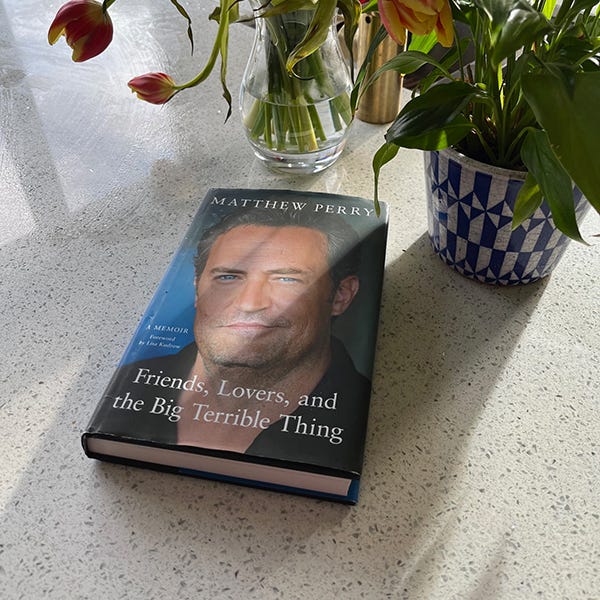If wanted to read the Matthew Perry Memoir since I’d started seeing the press about it during 2023. So it was already on my Christmas list before he passed away in November.
Suddenly it seemed quite macabre to want a copy of his book - as if I was just after some juicy gossip about his heartbreaking story. But I knew I’ve always been a fan and had wanted to read it when he was promoting it, so I went ahead and added it to my Christmas list (by which I mean mentioned it when my mum and husband asked me what I wanted).
I don’t think I’ve ever read a whole non-fiction book before. Oh actually - I tell a lie - I think I finished The 5 Love Languages. And I came close to finishing Gut. But non-fiction, I find, generally has a summing up recap kind of ending rather than an exciting climax so I think that’s probably why they don’t get me to reach the back cover.
This memoir however had me glued to the last few pages in the same way as a fiction book.
Now, I like a chronological story - especially when it’s an anecdote. My husband and kids always tell me tales which jump around with bits in the wrong order and I find myself making them back track or correct themselves so that I can actually piece together what they’re telling me in a proper order. Stories of who said what at nursery drop off or in the play ground turn more into witness statements by the time I’ve finished with them. But details matter, right? (That sounds like an over used phrase from season 2 of Reacher.)
Friends, Lovers and the Great Terrible Thing is not a chronological tale. It jumps around - I feel it even contradicts in places - and if it was a novel or even a film it’d probably have me frustrated and annoyed. But something about it lets you just overlook the factual story telling and go with the flow. Whilst I want every little shred of info about what it was like to work on Friends and how the life of a TV and movie star is off camera, it ends up you don’t need it to read like a detective’s investigation. The important thing is you get the essence of his life: of his loves, his adventures - and his illness. I’m not even sure all of the sentences are that well structured but it’s easy and quick to read as you just listen to this man’s voice tell you about his trials and tribulations.
Having said all that, for the details spotters there is plenty to reference, such as him telling us which series’ of Friends he was afflicted with which downfall - an addiction to alcohol or an addiction to drugs.
Is it sad? Yes. Did I cry? Yes. But not at the point you might expect. The end of the book is filled with hope - I don’t think that’s a spoiler - but that’s not what made me start to sob out loud. There’s a line in chapter xxx where he’s talking about the first play he wrote. Whilst it went down a storm in the UK it wasn’t that popular in the US.
“[…] and I realized that The End of Longing wasn’t going to be beloved enough to cement my future as a budding David Mamet. But there is still time!”
Those final words hit me like a sledgehammer. Probably all the more so as they stand near the top of an otherwise empty page - the end of a chapter. One minute you’re engrossed in his story about his budding playwright career, the next you’re floored by the realisation that he didn’t have time. And I wept for him and his unrealised dreams.
I’ve read since that is a book of hope - and it is. There seem to be so many times that he turned a corner, for a while at least. But knowing his ending, you can’t help but wonder… did he know what was coming? Is it like a film where you know they’re leaving things unsaid, or the opposite, because some great disaster is about to come?
I’ve been there before, and I could do it again: the complete rebuilding of a man. I didn’t know this man, but he seemed to be a nice guy, and it looked like he had stopped beating the shit out of himself with a baseball bat finally. I was very eager to see who this man was!
I’ve never before read a book where you could Google so much of what was being said. Every reference to a girlfriend, every news headline or tv interview he mentions, I would switch to my phone and look it up. He even references Googling his parents, so I did.
I do really wonder how I’d have read the book if he was still alive at the time of me reading it. Perhaps the parts about addiction - which is most of it - wouldn’t have hit so hard. Or the sections about how lonely and unhappy he was at times wouldn’t have made me feel for him so much. I do think the hopeful sections would have felt truly uplifting. As it is, it’s a very powerful book, an important book, to help people understand - or try to understand - the disease of addiction. It’s also a must for any Friends or Matthew Perry fans.




